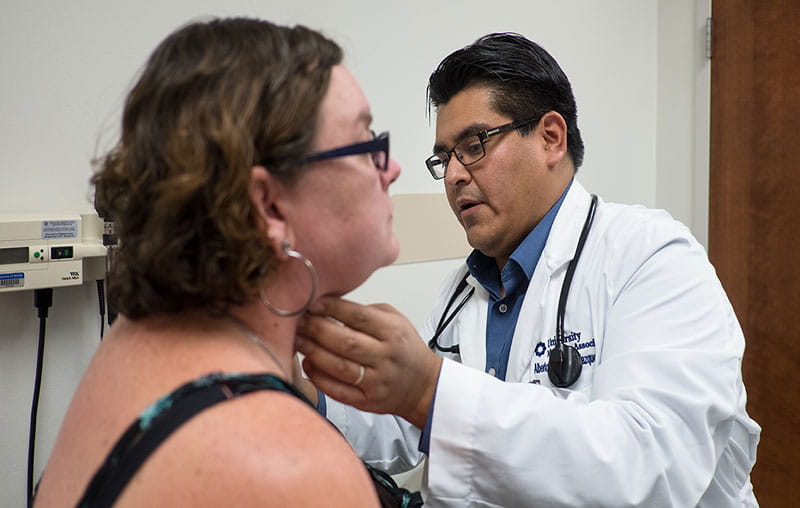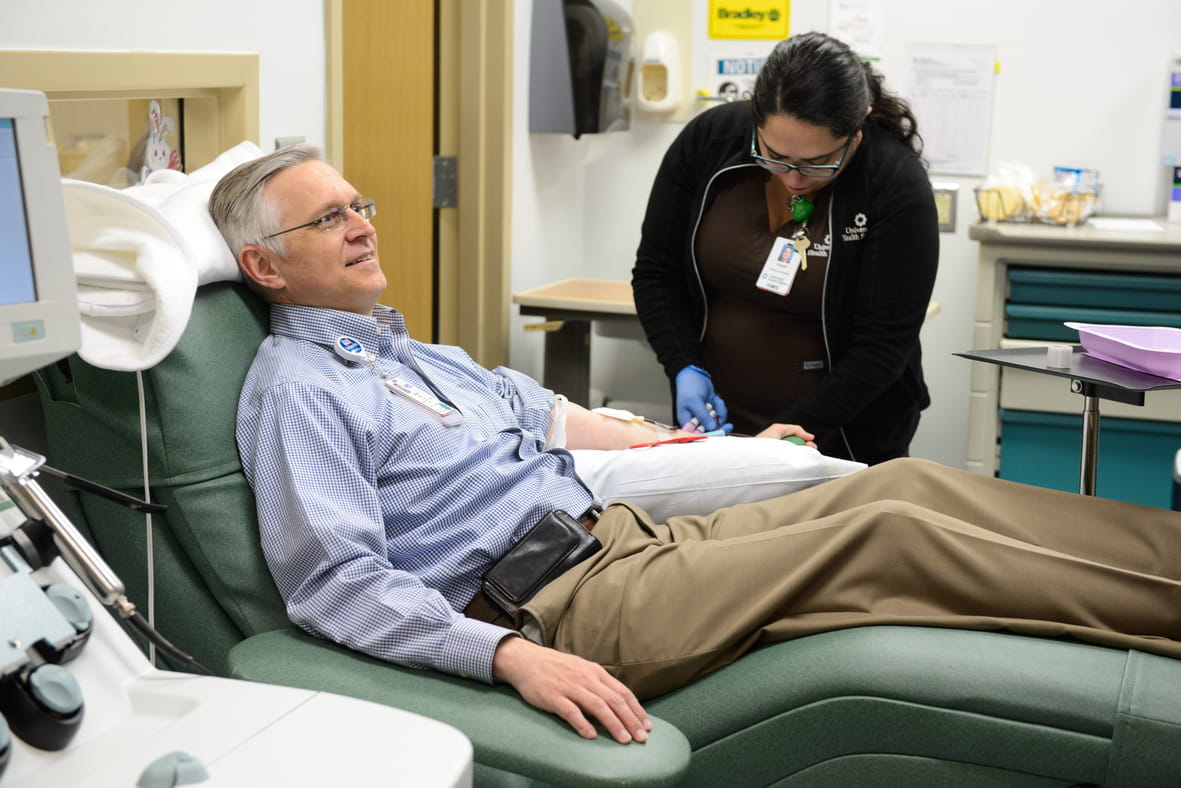We’re facing an uptick of COVID-19 cases while heading into the heart of flu season. As a result, pulmonologists will likely be treating a higher number of patients with pneumonia this winter. Here’s what you need to know about this commonly misunderstood disease and why you should take pneumonia seriously.
What is pneumonia, and what causes it?
According to the American Thoracic Society, pneumonia is an inflammation of the air sacs in the lungs, usually due to an infection. The infection causes the air sacs (alveoli) to fill up with pus or fluid in the lungs. This makes it more difficult for oxygen to get into your bloodstream. When the infection expands to both lungs, it’s diagnosed as double pneumonia.
Some people get what’s called walking pneumonia which is a milder case of the disease. Often these patients don’t realize they have pneumonia because they don’t experience shortness of breath or other debilitating symptoms.
Pneumonia is usually caused by a bacteria or virus, but in some cases it can develop due to a parasite or fungus. There are also instances in which patients can get aspiration pneumonia, which can occur when your airways or lung tissue get irritated after food or liquid accidentally get into your lungs.
Is pneumonia contagious and what are the symptoms?
Viral pneumonias are very contagious – especially those contracted from influenza or COVID-19. They can spread when an infected person in the room sneezes or ejects droplets while talking. These viruses can even live for a while on nearby surfaces. While bacteria-based pneumonias are less contagious, they can be transferred to you, for example, if someone sneezes directly on you and the secretions come in contact with your mouth or nose.
“It’s a common misconception that you get pneumonia from being out in the cold or rainy weather,” says Dr. Adriel Malavé a pulmonary and critical care specialist at University Health. He admits, “My parents passed that myth onto me as well. Being out in the cold is not the issue, it’s that people tend to spend more time indoors during the winter months, and they’re more apt to get infected by being in close contact with someone who is contagious.”
The American Thoracic Society indicates the most common pneumonia symptoms are:
Some people may also experience symptoms of pneumonia that include an upset stomach, diarrhea and chest pain. A less common symptom is fatigue without the presence of a cough or fever.
What are the complications of pneumonia?
Common complications may include the following:
- Dehydration
- Shortness of breath or you can’t sustain your breathing
- Severe illness that requires prolonged hospitalization
- Heart, kidney or other organ damage
- Cardiac arrest
How serious are complications of pneumonia?
Dr. Malavé explains that complications of pneumonia can come on quickly, sometimes within 24 hours. Scenarios can get to the point where the patient becomes significantly disabled or dies. Sometimes the effects are temporary and in other instances they’re long term. A bad case of pneumonia can result in someone needing physical therapy or oxygen treatments for months. For others, the organ damage they experience is irreversible.
People most likely to get severe pneumonia
“The groups that the CDC identifies as high-risk for pneumonia are the ones we see on a regular basis at University Hospital,” says Dr. Malavé. Here in San Antonio we treat a lot of people with underlying conditions such as diabetes, heart disease, asthma, smokers and the elderly. He added, “These groups are very prevalent in our community and unfortunately these patients tend to get the most severe cases of pneumonia.”
Treatments to fight pneumonia
Different treatments are administered to patients based on the type of pneumonia, the severity of the illness, the age of the patient and other existing medical conditions. Those with a viral form of pneumonia are treated with antiviral medications and helped with shortening the length of illness and symptom management. Bacterial-based pneumonias are treated with a broad spectrum antibiotic followed by a targeted antibiotic when tests pinpoint the type of bacteria causing the infection. The American Lung Association indicates that many people with milder cases can successfully manage their symptoms at home.
Getting vaccinated is key
Children younger than five are more likely to get pneumonia as well as those aged 65 plus. Older adults are at greatest risk of serious illness and death. Getting a vaccine is an effective way to help prevent getting pneumonia – helping to block both viral and bacterial forms.
There are two types of vaccines that can help guard against this serious respiratory disease. Clinicians recommend the PCV13 aka Prevnar 13® or the PPSV23 aka Pneumovax 23® – which protects against 23 types of pneumococcal bacteria.
Pneumonia is among the top 10 causes of death in the U.S. and the world. That, combined with the high incidence of COVID-19 cases in our community and heading into peak flu season, is why Dr. Malavé urges his patients to get both the pneumococcal and flu vaccines. He also emphasizes the critical nature of following CDC guidelines that protect against COVID-19 – as it will simultaneously protect against catching pneumonia and other respiratory illnesses.
“In the past several months, we’ve seen patients with severe cases of COVID pneumonia. They started to get better and then they got a secondary infection, which included a type of bacterial pneumonia. This happened just as they started to recover from the pneumonia caused by their COVID-19 illness - and unfortunately these scenarios often led to bad outcomes.”
Dr. Malavé concludes, “On a positive note, countries in the southern hemisphere, like Australia, have reported lower influenza activity. As people are wearing masks and practicing these various precautions, it’s helping to protect the population from getting different types of pneumonia. This is a good indicator and gives us some encouragement.”
If you get sick this year, you may wonder if you have the coronavirus, the flu or some form of pneumonia. But don’t try to figure it out for yourself. At the first sign of symptoms, reach out to your doctor and get tested so you can get an accurate diagnosis and the proper treatment as quickly as possible.




